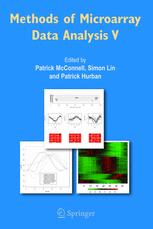

Most ebook files are in PDF format, so you can easily read them using various software such as Foxit Reader or directly on the Google Chrome browser.
Some ebook files are released by publishers in other formats such as .awz, .mobi, .epub, .fb2, etc. You may need to install specific software to read these formats on mobile/PC, such as Calibre.
Please read the tutorial at this link: https://ebookbell.com/faq
We offer FREE conversion to the popular formats you request; however, this may take some time. Therefore, right after payment, please email us, and we will try to provide the service as quickly as possible.
For some exceptional file formats or broken links (if any), please refrain from opening any disputes. Instead, email us first, and we will try to assist within a maximum of 6 hours.
EbookBell Team

0.0
0 reviewsSince the inception of microarrays, studies in this field have drastically evolved with analysis methods needing to advance in-step. The CAMDA conference plays a role in this ever-changing discipline by providing a forum in which investigators can analyze the same datasets using different methods.
Methods of Microarray Data Analysis V is the fifth book in this series, and focuses on the important issue of analyzing array data in a time series with correlating biological data. Previous books in this series focused on classification (Volume I), pattern recognition (Volume II), quality control issues (Volume III), and survival analysis (Volume IV).
In this volume, all investigators analyzed a single dataset on the lifecycle of the most deadly of malaria parasites, Plasmodium falciparum. The emphasis this year is on the application of novel and existing computational methodologies towards infectious disease. We highlight an introductory chapter by Raphael D. Isokpehi, a leading expert in the field of malaria. Ten of the papers presented at the conference are included, which range from the inference of genetic networks to the analysis of the spatial correlation of array data. This book is an excellent reference for academic and industrial researchers who want to keep abreast of the state-of-the-art in microarray data analysis.
Patrick McConnell is a researcher in the Duke Bioinformatics Group in the Duke Comprehensive Cancer Center.
Simon M. Lin is a faculty member in the Robert H. Lurie Comprehensive Cancer Center and associate director of Bioinformatics at Northwestern University.
Patrick Hurban is director of Investigational Genomics at Icoria, Inc., a Clinical Data company.